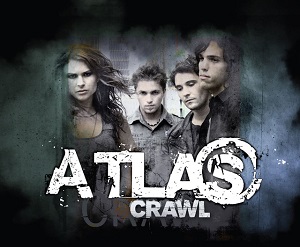
The Datsuns are a hard rock band from Cambridge, New Zealand, formed in 1998. Founding mainstays are Rudolf "Dolf" de Borst on vocals and bass guitar, and Christian Livingstone and Phil Somervell, both on guitar. They have released seven albums, with their debut self-titled album from October 2002 peaking at no. 1 in New Zealand and reaching the top 20 on the United Kingdom's Official Charts. They had relocated to London in 2002. Their second album, Outta Sight/Outta Mind, appeared at no. 7 in New Zealand and top 60 in the UK. Smoke & Mirrors (2006) peaked in the top 20 in New Zealand. Early drummer Matt Osment was replaced by Ben Cole after that album. Their top 40 singles in the UK are "In Love" and "Harmonic Generator". In New Zealand, their highest-charting single, "Stuck Here for Days" (2006), reached the top 30.

The music of New Zealand has been influenced by a number of traditions, including Māori music, the music introduced by European settlers during the nineteenth century, and a variety of styles imported during the twentieth century, including blues, jazz, country, rock and roll, reggae, and hip hop, with many of these genres given a unique New Zealand interpretation.

Split Enz were a New Zealand band formed in 1972. Regarded as the first New Zealand band to gain significant recognition outside of Australasia, they were initially noted for their progressive/art rock sound, flamboyant visual style and theatrical performances. The band later moved toward a pop/new wave sound that yielded the breakthrough hit single "I Got You" (1980). Split Enz broke up in 1984. Since that time, the band has staged several brief reunions.

Sir David Joseph Dobbyn is a New Zealand musician, singer–songwriter and record producer. In his early career he was a member of the rock group Th' Dudes and was the main creative force in pop band DD Smash. Since then he has released the majority of his recordings as a solo performer.

Shihad are a rock band formed in Wellington, New Zealand in 1988. The band consists of founders Tom Larkin, Phil Knight and Jon Toogood, who were joined by Karl Kippenberger in 1991. The band were known as Pacifier between 2002 and 2004.
The Dukes are a five-piece rock band from Christchurch, New Zealand. Their debut album, Lil Sunshine, was released in 2005. Their second album, Still Life, was released in 2010 throughout New Zealand spawning the Gold certified Top 10 single "Vampires".
The Mutton Birds were a New Zealand rock music group formed in Auckland in 1991 by Ross Burge, David Long and Don McGlashan, with Alan Gregg joining a year later. Four of their albums reached the top 10 on the New Zealand Albums Chart, The Mutton Birds (1992), Salty (1994), Envy of Angels (1996) and Rain, Steam and Speed (1999). They had a number-one hit with "The Heater" (1994), while their two other top 10 singles were a cover of "Nature" by the Fourmyula (1992), and an original, "Anchor Me" (1994). From 1996 to 2000 the group were based in England; they returned to New Zealand and then disbanded in 2002.

The Soup Dragons are a Scottish alternative rock band of the late 1980s and early 1990s. Named after a character in the 1970s children's television series Clangers, the group is best known for its cover of the Rolling Stones' song "I'm Free", which was a Top 5 hit in the United Kingdom in 1990; and "Divine Thing", a Top 40 hit in the United States in 1992.
Fast Crew were a New Zealand hip hop group consisting of five members – Dane Rumble, Jeremy Kent-Johnston, Diablo Deville, Gemma Copas and DJ Alias.

Greg Johnson is a New Zealand singer songwriter.
Tadpole was a New Zealand rock band from Auckland led by female vocalist Renée Brennan. The band formed in June 1994 and broke apart in late 2006 after numerous changes to the line-up.
Nesian Mystik was a New Zealand hip-hop/R&B group which formed in 1999. The cultural backgrounds of its members united a remarkable diversity of Polynesia by bringing together Cook Island, Tongan, Samoan and Maori ancestry. As well as producing a record number of Top 10 New Zealand singles, Nesian Mystik supported international acts such as Robbie Williams, Missy Elliott, Shaggy and The Black Eyed Peas. The group officially disbanded in 2011 after a successful music career that included four commercially successful albums and numerous New Zealand Music Award nominations.

"Crawl" is the first commercially available single by New Zealand rock band Atlas, released in 2007 from their debut album, Reasons for Voyaging. It stayed atop New Zealand's RIANZ Singles Chart for seven weeks and was certified gold for selling over 5,000 copies in New Zealand. A music video directed by Olly Langridge was created for the song. In a 2009 interview with New Zealand news media site Stuff, vocalist Sean Cunningham said, "Believe it or not, when we were writing 'Crawl' we didn't know it was a catchy song."
Siren Records was an independent music label based in Auckland, New Zealand formed in 2000.
Rubicon was a New Zealand pop punk band best known for their singles "Bruce" and "Funny Boy" from the early 2000s.
Augustino were a rock band from Auckland, New Zealand, best known for their 2002 single "Into the Grain".

Broods are a musical duo from Nelson, New Zealand, composed of Georgia Josiena Nott on lead vocals, with older brother and multi-instrumentalist Caleb Allan Joseph Nott on production and backing vocals.

"Nobody Else" is a song by New Zealand musician brothers Tex Pistol and Rikki Morris. It was the follow-up single to Tex Pistol's cover of Wayne Fontana's "The Game of Love", which reached number one in New Zealand in 1987. "Nobody Else", an original song, also charted at number one.
The Radars were a New Zealand group that was made up of mainly visually impaired musicians. They backed Deane Waretini on his no 1 hit "The Bridge" in 1981, and they won the Best Polynesian Album award at the 1983 New Zealand Music Awards. They played mainly around Auckland.
Nash Chase is a former pop singer from New Zealand who recorded for the Ode and HMV labels. He released a string of singles in the early 1970s. He is remembered for "What Greater Love", "Today I Killed a Man I Didn't Know" and "Anderson and Wise".










